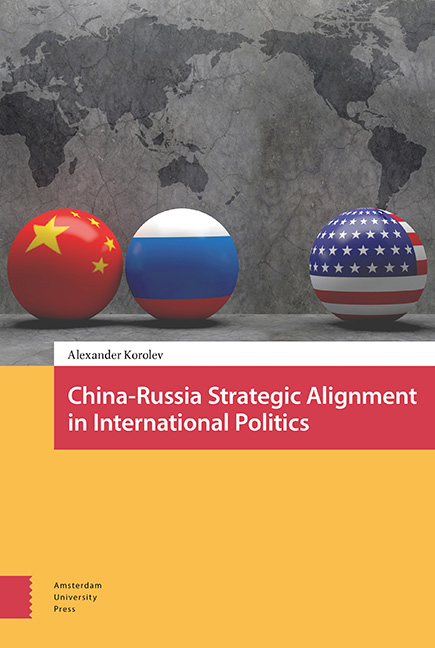Book contents
- Frontmatter
- Dedication
- Table of Contents
- List of Figures and Tables
- Acknowledgments
- 1 Introduction: The Elusive Nature of China–Russia Relations and the Need for Theory
- 2 The Ordinal Model of Strategic Alignment
- 3 Military Cooperation: Approaching Alliance
- 4 Alignment Incentives: The Three Balances
- 5 Robustness Check: Economy and Diplomacy
- 6 Comparative Mapping: US–India and China–Russia Alignments
- 7 Conclusion: Empirical Findings and Theoretical Implications
- Index
3 - Military Cooperation: Approaching Alliance
Published online by Cambridge University Press: 07 October 2022
- Frontmatter
- Dedication
- Table of Contents
- List of Figures and Tables
- Acknowledgments
- 1 Introduction: The Elusive Nature of China–Russia Relations and the Need for Theory
- 2 The Ordinal Model of Strategic Alignment
- 3 Military Cooperation: Approaching Alliance
- 4 Alignment Incentives: The Three Balances
- 5 Robustness Check: Economy and Diplomacy
- 6 Comparative Mapping: US–India and China–Russia Alignments
- 7 Conclusion: Empirical Findings and Theoretical Implications
- Index
Summary
Abstract
This chapter is the empirical examination of the first cluster of the alignment framework developed in Chapter 2 – the stadial institutionalization of China–Russia alignment. It demonstrates the development trajectory since the end of the Cold War and delves into the underreported routinized inner workings of China–Russia alignment, going beyond the prevalent focus in the related studies on China–Russia arms deals. By tracing the evolution of China–Russia alignment from the “early,” through the “moderate,” and to the “advanced” indicators of alignment, it demonstrates that post-Cold War China–Russia relations have, from a low starting point, grown steadily stronger. Currently, China–Russia alignment sits at the borderline between moderate and advanced alignment, while moving gradually into the advanced category. The upward trend is consistent, and there exists a basis for more advanced forms of bilateral strategic cooperation.
Keywords: China–Russia military cooperation, strategic alignment, military alliance
As mentioned in the previous chapters, there has been a good deal of ambiguity in the assessments of post-Cold-War China–Russia cooperation. While most of the official “names” of the relationship indicate an upward trend, how close are the two countries based on the ordinal framework and indicators of alignment developed in Chapter 2? Figure 3.1 displays the trajectory of post-Cold War China–Russia military cooperation. While there are chronological overlaps between the indicators, the transition into higher-level cooperation at each stage happens after the previous stage of cooperation has become high.
China–Russia cooperation treaty
As elaborated in Chapter 2, a formal treaty cannot be an exhaustive indicator of interstate alignment. It is even more so in the case of China–Russia relations. For example, Fomin et al. (2019) has systematically studied the correlation between Russia's formal alliance obligations and the patterns of its actual military and political cooperation and discovered no significant association between the level of formal alliance commitments and the actual military cooperation. Instead, the formal obligations that Russia enters into with other countries have been shown to do more with diplomatic gesturing and support within international institutions (Fomin et al., 2019). At the same time, the formal treaties cannot be dismissed altogether as they do carry some information and can be a first step in understanding strategic cooperation.
- Type
- Chapter
- Information
- Publisher: Amsterdam University PressPrint publication year: 2022



